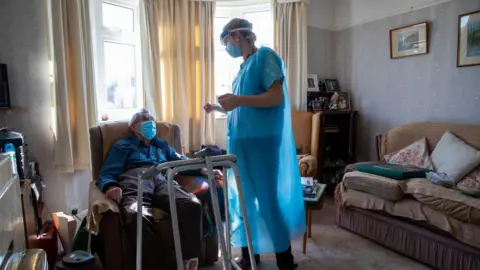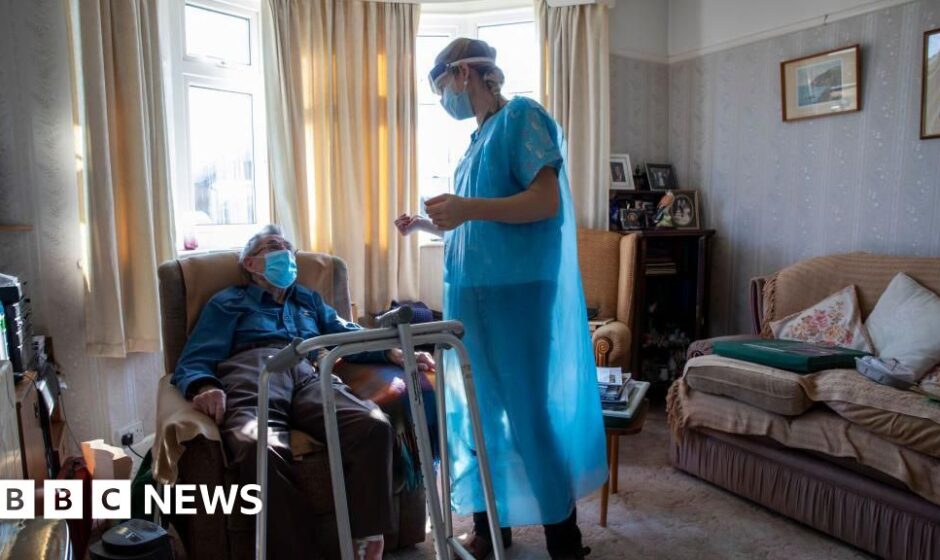 Getty Images
Getty ImagesMillions of patients will be treated closer to home under plans to “fundamentally rewire” the NHS in England, the prime minister has said.
A new network of neighbourhood health hubs will be set up to shift care out of hospitals and into the community.
Sir Keir Starmer said the NHS needed to “reform or die” and provide patients with “easier, quicker and more convenient care, wherever they live”.
But the Royal College of Nursing warned that moving services out of overcrowded hospitals would be impossible without policies to boost the “depleted and undervalued” nursing workforce.
Sir Keir will use a speech in London later today to launch the government’s 10-year plan for the NHS in England.
Over the next decade, around 200 new neighbourhood health centres will be set up, staffed by a mix of GPs, nurses, social care workers, pharmacists, mental health specialists and other medics.
The centres will eventually be open 12 hours a day, six days a week, the government has said.
The exact make-up of services will depend on the local area, with some outreach teams going door-to-door to contact vulnerable and hard-to-reach patients.
“This shift is important, not just for the future of the NHS, but given the demographics, it’s really important for patients, their families and their communities,” said Sir Jim Mackey, the new chief executive of NHS England.
“We have a model that is built on the default of hospitalisation and it’s just not right for them.”
By 2035, the intention is that the majority of outpatient care will happen away from hospitals, including many scans, mental health checks, eye examinations and follow-up appointments after surgery.
Local hubs could also offer extra services including debt advice and employment support, as well as stop smoking and weight management classes, the government suggested.
The Health Secretary Wes Streeting said the plan will bring down “devastating hospital waiting lists and stop patients going from pillar to post to get treated”.
As of April, there were 7.39 million people waiting for an operation or another planned appointment in England.
Money and staffing
Thea Stein, the chief executive of the health think tank the Nuffield Trust, said the plan had the “right aspiration” but warned that moving care closer to home “doesn’t mean care on the cheap”.
“Let’s be under no illusion: this is not a money saving measure,” she said.
“Simply saying that the approach will be rolled out, without full details on how to bring it about, casts doubt on whether it will stick.”
The government said the money to pay for the new service will come from the £29bn boost to NHS funding announced in the last Budget.
A new workforce plan for the health service is expected to be announced later this year which will set targets to recruit new staff to work in community care.
The Royal College of Nursing said teams of district nurses and health visitors, who keep patients safe and well at home, have fallen by thousands over the last 15 years in England.
And the British Medical Association, which represents doctors, said that big questions remain about who will staff any new services and how they will be funded.
“The limited workforce, who are already feeling undervalued must not be moved around like pieces on a chess board or made to work even harder,” said BMA council chair Dr Tom Dolphin.
The Royal College of GPs said it was concerned about the current state of many GP practices which are “in dire need of renovation” and a lack of jobs for newly-qualified GPs.
Other measures in the plan, which runs to more than 150 pages, include:
- GPs to be encouraged to use artificial intelligence (AI) to take patient notes, while technology will be introduced to speed up the answering of calls to surgeries
- Newly-qualified dentists to be forced to work for the NHS for at least three years before moving into private practice
- Dental therapists, who tend to carry out some of the straightforward work of dentists, to undertake check-ups, treatment and referrals
Matthew Taylor, the chief executive of the NHS Confederation which represents large NHS trusts, said that new neighbourhood health services would need sustained investment in buildings and digital infrastructure.
“The reality is that without the radical action outlined in this plan, the NHS as a universal service is in unprecedented danger,” he said.
The Conservative MP and shadow health secretary Edward Argar said the NHS needed “reform, not just more cash” and warned that Labour’s plan had to be “real and deliverable for patients”.
Liberal Democrat leader Ed Davey said the whole 10-year NHS strategy would be a “castle built on sand” unless ministers tackled what he described as a “crisis in social care”.
#plan #fundamentally #rewire #NHS



